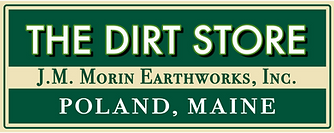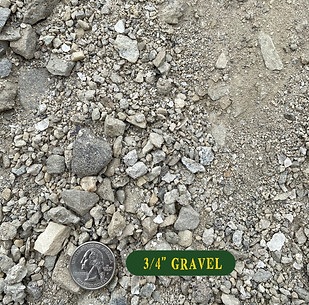

WHAT ARE AGGREGATES?
Aggregates are raw, natural materials extracted from pits and quarries. Some common forms you have probably heard of include gravel, crushed stone, and sand. When these aggregates are combined with a binding medium, like water, cement, and asphalt, they are used to form compound materials, such as asphalt and concrete.
WHY ARE AGGREGATES IMPORTANT?
Aggregates are often overlooked by people on a daily basis. They're just rocks, after all, what's the big deal? Turns out they are a big deal. Aggregates are technically the building blocks of our society with aggregate production dating all the way back to the Roman Empire. They are not just used for the foundations of our roads, but also for bridges, buildings, about 90% of asphalt pavement and around 80% of all concrete mix. That's a lot of rocks! Just imagine, on average, 38,000 tons of aggregates are needed to construct a single lane of highway one mile long. That's the same weight as about 71 men for each FOOT of a single lane highway! If that doesn't make you stop to appreciate the aggregates of the world, think about this: the average home requires around 400 tons of aggregate and the average school or hospital requires about 15,000 tons. THAT'S A TON OF ROCKS! (pun intended!) There's more! Get this, the average American needs roughly 10,000 tons of aggregate per year. Sound unreal? Think about this: we would not have glass and plastic without sand, or pennies without zinc. We get calcium carbonate for those helpful antacids from calcium, and silica used for computer parts comes from quartz. Many of us rely on water and air filtration - most of which would not be possible without aggregates. Aggregates are pretty important indeed!
WHAT MAKES AN AGGREGATE A GOOD AGGREGATE?
Simply put, aggregates are only as good as their processing. Did you ever smash rocks together as a kid to see what would happen? Well, you processed aggregates! But the high quality aggregates we offer for construction, home projects, and decorative projects must be mined, crushed, separated, and (for higher end products) washed. At the highest level, aggregates will have uniform, predictable, and consistent properties. Here at The Dirt Store, we carry a large selection of aggregates for various applications. No, we don't carry the silica for your computer parts, but you can count on us for your different size gravels, varied stones, reclaim, sands for several applications, among other aggregates. Below are some of the products we offer. Feel free to reach out if you're not sure what you need or can't find what you're looking for. We love to help!

Childhood Aggregate Processing

Building a Woods Road

3/4" crushed stone can really dress up a walkway! Photo courtesy of Central Maine Property Management, a customer of ours who serves the Lewiston/Auburn area.
GRAVEL
The term "gravel" takes on many definitions depending on where you are and who you're talking to. When we say gravel, we're referring to what's commonly known as "crusher run gravel" which consists of crushed rock as well as the fines. Gravel is most often used for driveway installation and repair, as a base for masonry/hardscaping work, and even for structural fill depending on the project. We carry multiple sizes of gravel from 3/8" up to 3". The size of the gravel indicates the largest size stone you will find in that particular gravel. For example, 3/8" gravel has stones up to 3/8" in size and 3" gravel has stones up to 3" in size. We carry top quality gravel for all of your projects and are always more than happy to help you decide which product will be best for you. Ask about our new Blue Gravel!

STONE DUST
Stone Dust is a byproduct created when aggregates are crushed to make other products such as rip-rap, crushed stone, and gravel. Once deemed a waste material, it is now a popular product for hardscape projects, budget-friendly structural fill, walkways, driveways and more.

RECLAIM
Reclaim, also know as reclaimed asphalt, is a product made from asphalt that has been torn up from existing roads, parking lots, and driveways. The old asphalt is then crushed and screened down to 3/4" and smaller. This is an affordable alternative to pavement because when the material is properly applied, it can offer a pavement-like surface which is easier to maintain, plow, and keep mud free than a gravel surface.

ROUND STONE
Round Stones, otherwise known as River Rocks, are unwashed natural stones mainly used for decorative purposes. As the name suggests, these stones are all naturally smooth as they are found in sandy riverbed deposits from long ago. Often used for drainage around hot tubs, pools or around patios, when these stones get wet the colors will add a natural beauty to your outdoor spaces. We carry 3/8" round stone, which includes stones up to 3/8" in size, 3/4" round stone, which includes stones up to 3/4" in size and 1 1/2" round stone, which includes stones up to 1 1/2" in size. As an unwashed product, you may want to hose it down prior to placement depending on your project.

3/8 PEA STONE
3/8 Pea Stone is a small washed stone used mainly for decorative projects such as walkways, fire pits, small drainage use, etc. It is popular for patio areas and fire pits as its small size is "barefoot friendly" and makes a secure footing for patio furniture.

CRUSHED STONE
Crushed stone is often confused with gravel yet is very different. It can be described just as its name implies - crushed stone. Unlike gravel, there are no fines in this product. This aggregate does not compact together and, as such, it offers better drainage properties than gravel. Our 3/4" crushed stone includes angular stones varying from 1/2" up to 3/4". It is most commonly used for drainage around the perimeter of buildings, under drip edges, downspouts, etc. It is also commonly used for walkways, parking areas and for filling muddy holes in gravel driveways. Some use it as a decorative product rather than mulching to help prevent unwanted weeds. The 1 1/2" crushed stone we carry consists of angular stones varying in size from 1/2" up to 1 1/2". It is most often used for septic systems and drainage swales.

WASHED SAND
Washed Concrete Sand is a screened, coarse, clean sand good for masonry projects, pipe underlayment, and concrete work. Also used for sand boxes and pool underlayment. We also have Brick Sand and Pool Sand available for other projects.

EROSION STONE/RIP RAP
Erosion stone, also known as Rip-Rap (not riff-raff!) is another man made stone created from crushing aggregates. The end result creates large angular stones which are often used as a permanent layer to stabilize and protect the soil surface against erosion. Most stones are 4"-6" in size. This variation is commonly used for ditches and bankings.

BLUE SIDNEY STONE
Blue Sidney Stone is a washed, crushed ledge from aggregate sources in central Maine. The deep blue color offers a dramatic touch to any outdoor project. Similar to 3/4 crushed stone but with a touch of flair, these attractive stones work well for drainage, walkways, touching up fire pits and more.

CRUSHED RED BRICK
Crushed Red Brick is just as it name implies - bricks that are crushed down to 3/4" in diameter. It is very popular for use in decorative projects like walkways, around shrubs, flower beds, etc. The deep red color offers a more permanent alternative to mulching and adds color to any landscape.
